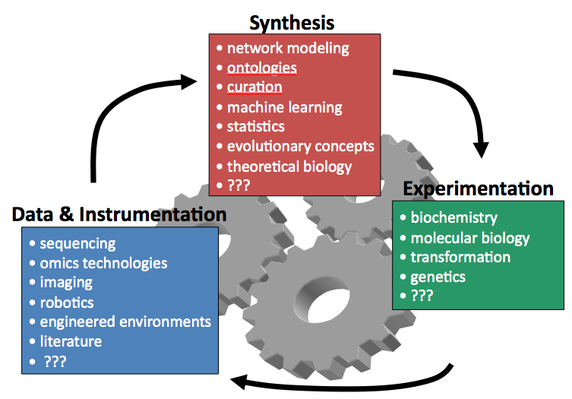Previous Research Interests
Research Interest Statement 2012

I believe plants are the most important life forms on earth. They give us the air we breathe, clothes we wear, houses we live in, energy we burn and drugs that cure our diseases or make us feel better. Plants will give us all of these until we last and then outlive us all. Despite all this, we know very little about how they do what they do. Even for the best-studied species, Arabidopsis thaliana (a wild mustard), we know about less than 20% of what its genes do and how or why they do it.
We want to uncover the molecular mechanisms underlying adaptive traits in plants to understand how these traits evolved. A bottleneck in achieving our goals is the limited understanding of the functions of most genes in plant genomes. With a sequenced genome as a starting point, we are building genome-wide molecular networks of genes and proteins using a combination of computational and empirical approaches. Using these networks, we want to elucidate functions of uncharacterized genes rapidly and systematically. Ultimately we are interested in finding patterns of network evolution to identify the evolutionary paths of functional innovation for adaptation.
The questions that we are pursuing are:
* Why are plants so robust to genetic and environmental perturbations and how do they express this resilience?
* How is plant metabolism wired and how does it evolve?
The approaches and projects we are developing to answer the questions are:
We want to uncover the molecular mechanisms underlying adaptive traits in plants to understand how these traits evolved. A bottleneck in achieving our goals is the limited understanding of the functions of most genes in plant genomes. With a sequenced genome as a starting point, we are building genome-wide molecular networks of genes and proteins using a combination of computational and empirical approaches. Using these networks, we want to elucidate functions of uncharacterized genes rapidly and systematically. Ultimately we are interested in finding patterns of network evolution to identify the evolutionary paths of functional innovation for adaptation.
The questions that we are pursuing are:
* Why are plants so robust to genetic and environmental perturbations and how do they express this resilience?
* How is plant metabolism wired and how does it evolve?
The approaches and projects we are developing to answer the questions are:
- Computational framework to predict metabolic networks of plants
- Reconstruction of co-function networks in plants
- Identification of genome-wide genetic interaction network of plants
- Empirical testing of plant metabolic networks using genetic and metabolomic approaches
- Novel method of measuring functional similarities
- Identification of all genes involved in complex traits such as salt tolerance
- Computational and empirical identification of signaling pathways and complexes
- Identification of novel classes of transcription factor regulators
- Characterization of novel gene families






